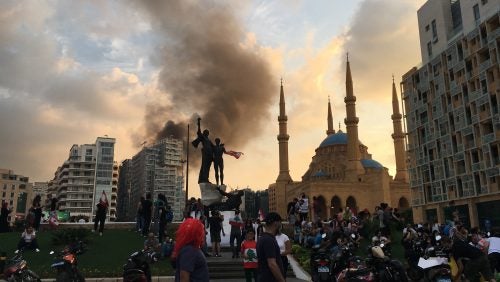Lebanon’s Government Muzzles Critics, Flaunts the ICCPR
January 27, 2022 by Digital Editor

Protesters in Beirut's Martyr's Square in October, 2019
By Fabienne El-Cid
Every person is guaranteed freedom of expression and opinion – “the right to hold opinions without interference” and “the right to seek, receive and impart information and ideas of all kinds” through any medium. Article 19 of the International Covenant on Civil and Political Rights (ICCPR), echoing Article 19 of the Universal Declaration of Human Rights (UDHR), obligates member states to ensure such freedoms for their citizens. Arguably, basic rights of media independence and access to information are central to these guarantees. However, while the ICCPR provisions are meant to provide basic human rights within a legal framework, they instead often function as ideals – ignored by states and difficult to enforce internationally. The current financial and political crisis in Lebanon demonstrates this failure.
On October 17, 2019, an uprising in Lebanon began in response to the country’s worsening economic and social conditions. Massive protests broke out and people took to social media to express their disgust with government corruption. For the last two years, Lebanon has plummeted into an extreme economic crisis – basic resources are incredibly scarce and expensive, and the Lebanese pound has lost roughly 90% of its value since 2019. The government, rather than trying to improve the livelihood of its people, has attempted to suppress negative press it is receiving on social media platforms, tasking a public prosecutor with investigating those who post criticisms. It has arrested individuals and summoned them for interrogation. Government agents have attacked media workers, with at least eighty documented assaults.
In disregarding its own people’s fundamental rights, the Lebanese government is clearly violating the ICCPR, as well as the UDHR. The government is interfering with the opinions of its people and utilizing scare tactics such as violence and legal action as a means of silencing the masses. Patrolling social and print media, the government wants to quash its people’s expression and make examples of those speaking against it. Politicians want Lebanese civilians to hide and cower rather than share their opinions and exercise their right to freedom of opinion and expression.
These rights are fundamental. The international community has determined such protections are so important that the ICCPR reflect the UDHR. The language is identical in both, stating everyone has a right to freedom of expression and opinion through any media and without interference. Both guarantee the right to an effective remedy for those whose rights and freedoms have been violated, with the ICCPR stating it is the responsibility of State parties to ensure such.
The Human Rights Committee is internationally mandated to enforce ICCPR rights. States must regularly submit individual reports, which are reviewed by the Committee and used in the Committee’s assessment of that State’s human rights. However, these assessments are not legally binding. Additionally, individuals can file a complaint with the Human Rights Committee against a State party who has violated their rights, so long as the State has “accepted the Committee’s competence” to review such complaints, either through accession to an Optional Protocol or ratification. Again, the Committee’s observations regarding an individual complaint are not legally binding.
Enforcement of the ICCPR is weak. States, in instances of both the Committee assessment and individual complaints, are meant to adhere to recommendations in good faith. However, local NGOs are encouraged to participate in the Committee’s process of acquiring information regarding a State’s human rights. These organizations submit shadow reports and offer suggested questions and areas of concern to the Committee. NGO participation is important as it can counter potential false information provided by the State itself. Unfortunately, no matter how accurate these assessments are, they remain, as mentioned, not legally binding.
Lebanon is a party to the ICCPR.The State is responsible for providing an effective remedy for those whose freedom of opinion and expression they violated. To date, there have only been three Human Rights Committee reports for Lebanon, with twenty years separating the second from the most recent in 2018. Twenty years is unacceptable as access to human rights has quickly deteriorated in the country since the 2019 revolution. Additionally, individuals are unable to file a complaint with the Human Rights Committee. Lebanon has not acceded to the Optional Protocol of acceptance of individual complaints procedures. Without these enforcement mechanisms, the Lebanese population is left waiting for the government to fulfill their responsibility under the ICCPR in good faith. This is near impossible as the government is the party violating rights and freedoms in order to protect their own interest.
Written words and actions do not align, and enforcement remains nonexistent. Lebanese politicians and governmental agents further their selfish agendas, seemingly confident their abuses will go unpunished. Therefore, this human rights mechanism does not provide any recourse whatsoever, let alone adequate recourse, to those detained or injured at the hands of the government.
Fabienne El-Cid is a 2L student and a graduate of Georgetown’s School of Foreign Service, where she concentrated in International Law and Arabic. She has previously externed at the International Corporate Accountability Roundtable (ICAR), an organization committed to protecting people and the planet from corporate abuse, and worked with the Public International Law & Policy Group (PILPG), where she researched and synthesized human rights violations to aid with post-conflict resolution in Iraq, Syria, and Yemen. Fabienne is the professional chair for Georgetown’s Arab Law Students Association and is a Law Fellow (teaching assistant) for the 1L Legal Practice course.

